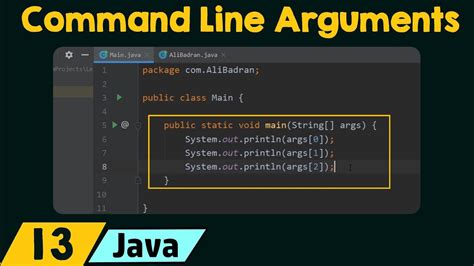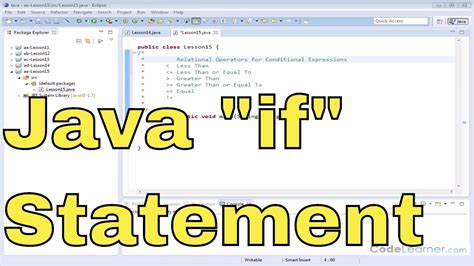Java, a high-level, object-oriented programming language, offers various ways to control the flow of a program's execution. Among these control structures, conditional statements are particularly useful for making decisions based on certain conditions. The single line if statement, also known as the ternary operator, is a concise way to express a simple if-else statement in a single line of code.
Introduction to Single Line If Statement in Java

The single line if statement, or the ternary operator, is represented by a question mark (?) followed by a colon (:). It takes three operands: the first is a boolean expression, the second is the value if the expression is true, and the third is the value if the expression is false. The syntax for the ternary operator is as follows: condition? value_if_true : value_if_false;
Example of Single Line If Statement in Java
Here is a simple example that demonstrates how to use the ternary operator to assign a value to a variable based on a condition:
int age = 25;
String status = (age >= 18)? "adult" : "minor";
System.out.println(status); // Outputs: adult
In this example, if the `age` is 18 or more, the `status` variable will be assigned the string "adult"; otherwise, it will be assigned "minor". This is equivalent to using a traditional if-else statement but is more concise.
Advantages and Use Cases of Single Line If Statements

The ternary operator is particularly useful in situations where a simple conditional decision needs to be made and the outcome directly influences the value of a variable or an expression. Some common use cases include:
- Conditional Assignment: When the value of a variable depends on a condition, the ternary operator can simplify the code.
- Returning Conditional Values: In methods where the return value depends on a condition, using the ternary operator can make the code more readable.
- Embedding Conditions in Expressions: It's useful for embedding conditional logic within larger expressions, making the code more concise and sometimes more readable.
Best Practices for Using Single Line If Statements
While the ternary operator can make code more concise, it’s essential to use it judiciously to maintain code readability. Here are some best practices:
1. Simplicity: Use the ternary operator for simple conditions. Complex conditions may be better handled with traditional if-else statements for clarity.
2. Readability: Ensure the condition and the return values are easy to understand. If the expression becomes too complex or long, consider breaking it down for better readability.
3. Performance: The ternary operator does not inherently offer performance benefits over traditional if-else statements. Its use should be based on code readability and maintainability considerations.
Key Points
- The ternary operator in Java is a concise way to express simple if-else statements.
- It is represented by the `condition? value_if_true : value_if_false` syntax.
- Useful for conditional assignments, returning conditional values, and embedding conditions in expressions.
- Should be used judiciously to maintain code readability, especially for simple conditions.
- Does not offer inherent performance benefits over traditional if-else statements.
Common Pitfalls and Troubleshooting
When using the ternary operator, it’s essential to be aware of potential pitfalls that could lead to bugs or readability issues in the code:
1. Nested Ternary Operators: Avoid nesting ternary operators within each other as it can significantly reduce code readability and may lead to errors.
2. Complex Conditions: Break down complex conditions into simpler, more manageable parts. This might involve using intermediate variables or traditional if-else structures for clarity.
3. Null Pointer Exceptions: Be cautious when using the ternary operator with objects that might be null. Ensure that null checks are appropriately handled to avoid NullPointerExceptions.
| Best Practice | Description |
|---|---|
| Use for Simple Conditions | Avoid complex logic within the ternary operator. |
| Maintain Readability | Ensure the expression remains easy to understand. |
| Avoid Nested Operators | Nesting can reduce readability and increase error likelihood. |

What is the primary use of the ternary operator in Java?
+The primary use of the ternary operator in Java is to simplify simple if-else statements into a single line of code, making it useful for conditional assignments, returning values based on conditions, and embedding conditional logic within larger expressions.
How does one avoid common pitfalls when using the ternary operator?
+To avoid common pitfalls, it’s essential to use the ternary operator for simple conditions, maintain readability, avoid nesting ternary operators, and be cautious with potential null pointer exceptions. Breaking down complex logic and ensuring intermediate steps are clear can also help in troubleshooting and code maintenance.
